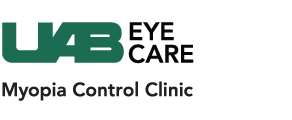Two UAB School of Optometry faculty recently spoke to Birmingham pediatricians about the recommended guidelines for treating myopic pediatric patients and shared research about slowing myopia progression over time.
Katherine Weise, O.D., professor at the School of Optometry, and Andrew Pucker, O.D., assistant professor, spoke to grand rounds attendees at Children’s of Alabama on Thursday, June 22. Their presentation, “Controlling Nearsightedness: Headlines, Hyperbole, and Hypotheses vs. The Evidence,” also included information about the newly developed Myopia Control Clinic at UAB Eye Care.
If one or both parents of a child is myopic, or nearsighted, odds are the child will also develop myopia, explained Weise.
“Myopia results from a complex combination of genetic and environmental factors,” she said.
Weise explained that through the Correction of Myopia Evaluation Trial, or COMET, which was held at UAB and monitored pediatric patients for 14 years, “we learned that nearsightedness tends to grow.”
COMET was funded by the National Institutes of Health and included multiple trial centers across the country. Through the study, it was also confirmed that the average period of myopic growth in children is nine years.
“As kids are growing and getting taller, their eyeballs are also growing longer,” she said.
Pucker spoke about research he has conducted on guinea pigs that examines the response to induced myopia.
He said myopia can be quickly and predictably induced using minus (myopic) lenses, which allows the effects to be studied. Using animal models allows for controlled testing of focused hypotheses, Pucker explained, and it also reduces study sample sizes to as few as five animals, while studies involving humans may require more than 1,000 subjects to obtain reliable results.
There are three ways to slow the progression of myopia: corneal reshaping contact lenses, soft bifocal contact lenses and atropine. These three methods of treatment are offered at the Myopia Control Clinic at UAB Eye Care.
Corneal reshaping contact lenses are worn during sleep and removed in the morning. They temporarily change the shape of the cornea so that a person can see clearly all day long without glasses or contact lenses.
Soft bifocal contact lenses are typically worn to help people aged 40 and older to read clearly and see far away. They can also be used to help slow myopia by bending light that enters the eye in a beneficial way.
Atropine is an eye drop that typically makes light seem bright because it makes the pupil increase in size.Low dose atropine (0.01%) has been shown to slow myopia progression by about 60 percent without increasing the pupil size or decreasing near vision dramatically.
To make an appointment at UAB Eye Care’s Myopia Control Clinic, call 205-975-2020 or visit uab.edu/eyecare.
